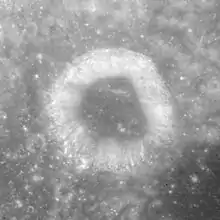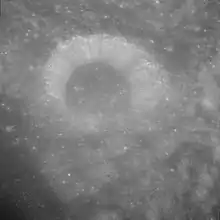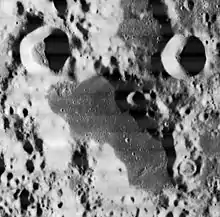Respighi (crater)
Respighi is a small lunar impact crater that is located to the southeast of the crater Dubyago, near the eastern limb of the Moon. To the east is the comparably sized Liouville.
 Apollo 15 image | |
| Coordinates | 2.8°N 71.9°E |
|---|---|
| Diameter | 18 km |
| Depth | Unknown |
| Colongitude | 289° at sunrise |
| Eponym | Lorenzo Respighi |

Apollo 11 image

The craters Respighi (upper left) and Liouville (upper right) from Lunar Orbiter 1. The dark, flat plain in the lower half is known as Schubert N.
This is a crudely circular crater with inner walls that slope down to the relatively darker (lower albedo) interior central floor. The rim has not suffered significant erosion from subsequent impacts, but there is a shallower section to the south. Attached to the southern rim of this crater is Schubert N, a formation that has the appearance of two or more merged craters with a dark, lava-flooded floor that is elongated to the southeast.
The crater is named for Lorenzo Respighi, 1824–89, Italian mathematician and astronomer.[1]
References
- "Respighi (crater)". Gazetteer of Planetary Nomenclature. USGS Astrogeology Research Program.
- Andersson, L. E.; Whitaker, E. A. (1982). NASA Catalogue of Lunar Nomenclature. NASA RP-1097.
- Bussey, B.; Spudis, P. (2004). The Clementine Atlas of the Moon. New York: Cambridge University Press. ISBN 978-0-521-81528-4.
- Cocks, Elijah E.; Cocks, Josiah C. (1995). Who's Who on the Moon: A Biographical Dictionary of Lunar Nomenclature. Tudor Publishers. ISBN 978-0-936389-27-1.
- McDowell, Jonathan (July 15, 2007). "Lunar Nomenclature". Jonathan's Space Report. Retrieved 2007-10-24.
- Menzel, D. H.; Minnaert, M.; Levin, B.; Dollfus, A.; Bell, B. (1971). "Report on Lunar Nomenclature by the Working Group of Commission 17 of the IAU". Space Science Reviews. 12 (2): 136–186. Bibcode:1971SSRv...12..136M. doi:10.1007/BF00171763.
- Moore, Patrick (2001). On the Moon. Sterling Publishing Co. ISBN 978-0-304-35469-6.
- Price, Fred W. (1988). The Moon Observer's Handbook. Cambridge University Press. ISBN 978-0-521-33500-3.
- Rükl, Antonín (1990). Atlas of the Moon. Kalmbach Books. ISBN 978-0-913135-17-4.
- Webb, Rev. T. W. (1962). Celestial Objects for Common Telescopes (6th revised ed.). Dover. ISBN 978-0-486-20917-3.
- Whitaker, Ewen A. (1999). Mapping and Naming the Moon. Cambridge University Press. ISBN 978-0-521-62248-6.
- Wlasuk, Peter T. (2000). Observing the Moon. Springer. ISBN 978-1-85233-193-1.
External links
- LTO-63D4 Respighi — L&PI topographic map
This article is issued from Wikipedia. The text is licensed under Creative Commons - Attribution - Sharealike. Additional terms may apply for the media files.